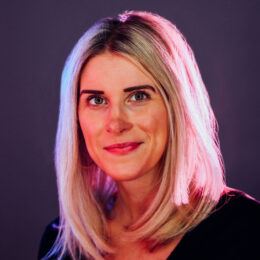Changing careers from one industry to another is daunting. It can feel even more troublesome when you are deep into one career path—knowing you want to make a switch—but you don’t know how to start.
I’ve been down this road! Five months after graduating with a doctorate in chemistry, I started to question my career choices. Spending hours alone in a windowless lab each day led me to become uninterested in hands-on research. I enjoyed the problem solving nature of research, but my favorite activities were building graphics for presentations, analyzing raw data, and learning about digital marketing for a blog I started. I began to crave an energetic work environment, where I could better demonstrate my unique blend of strategic and creative capabilities.
After a lot of soul searching and online applications, I managed to secure an entry-level job at a creative agency, which eventually opened doors to media and advertising. Most people were overwhelmingly supportive of this decision, but a handful of people made me question my motives with one simple question: “So, you just wasted four years of your life on a Ph.D. to work for a marketing firm?”
It took a bit of time, but ultimately I felt confident with my decision and likelihood to succeed in agency life. I realized many of the skills I developed during graduate school—though scientific and research-based—could be applied to a wide variety of job opportunities outside of the very narrow field I once studied. If you’re in a similar situation, this realization may help bring relief, knowing that previous career decisions don’t have to define the rest of your life.
Here is a takeaway of the skills I learned in graduate school that directly apply to a career in media and advertising.
Project management
This may be the most applicable skill to any industry, as there is a project management component nearly everywhere. It is also the most important. If you want to graduate on time or earlier than your peers, then you must excel at project management. When getting a PhD, you’re leading and managing many pieces to one large project—a thesis. The scientific method is the main driver for completing any kind of project, but it is solely up to the PhD candidate to ensure that all the moving parts of a project come together in a timely manner. This includes not only plan creation and execution, but collaboration with technicians and other students to understand the goals of a project, and unify on a common objective and desired result. In many respects, project management and client management go hand-in-hand.
Strategic thinking
Problem solving is what getting a PhD is all about—especially in chemistry. Having the perseverance to keep trying new solutions, and follow a strategic plan can help get better results faster. A laboratory setting is all about testing, and in reality, the media industry is, too! Creating a sound, strategic plan to understand what will work best for your clients helps instill confidence that your agency will skillfully manage their media dollars.
Data analysis
Data analysis is another cornerstone of scientific research and advertising alike. You must often bring clarity to gray situations, and make sure your data helps tell the story of the result. Interpreting and writing up results will comprise your thesis in graduate school, and these skills can be applied while providing insightful post-campaign reporting for your clients or investigative data studies.
Clear communication
Expectations for a project must be clearly communicated to collaborators and technicians in order to achieve the desired result. More importantly, a PhD candidate must develop the skills to explain the results of a project—and the corresponding technical information—in layman’s terms. One of my graduate professors once told me this is the most important skill you’ll develop, as it is required for any kind of laboratory project to win funding, and in an ideal world, be developed for industrial practices. Advertising has plenty of technical components. It’s important to be able to understand and translate the industry jargon to clients who are less familiar than you.
Professionalism
Graduate school brings the opportunity to speak publicly and present your work. Oftentimes, you’ll be in front of a speculative audience and need to appropriately field questions on the fly. If you do it right, you learn how to handle yourself in a professional manner regardless of circumstance or critique. Advertising is a client service industry. Professionalism with clients is crucial to maintaining trustworthy and effective relationships. This is also important for managing your team, since it is your job to make sure campaigns are executed correctly and efficiently.
Desire to learn
While this isn’t a skill developed in school, it is an innate characteristic of a graduate candidate. Research requires endless hours of scouring publications for ideas that can help support theories, or to understand how to approach new projects. The ad tech industry is an ever-changing landscape, and keeping up with how these changes will affect your clients is all part of the job!
Whether or not you went to graduate school, chances are that you’re capable of demonstrating many of these skills from your previous educational and occupational history. If you’re hoping to make a career change into media, but you’re not sure how, understanding where you’ve already applied the above is a great start!
Arm Candy is always interested in meeting and acquiring new talent, and could be the right fit for you. Head over to our Careers page to learn more about available opportunities!


